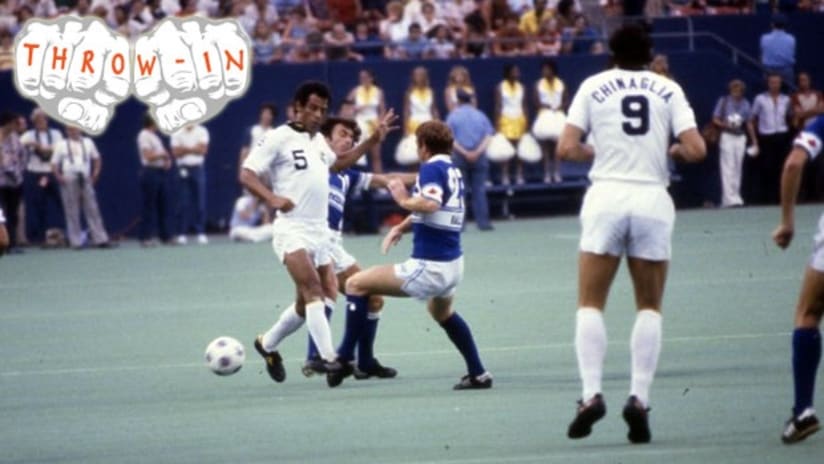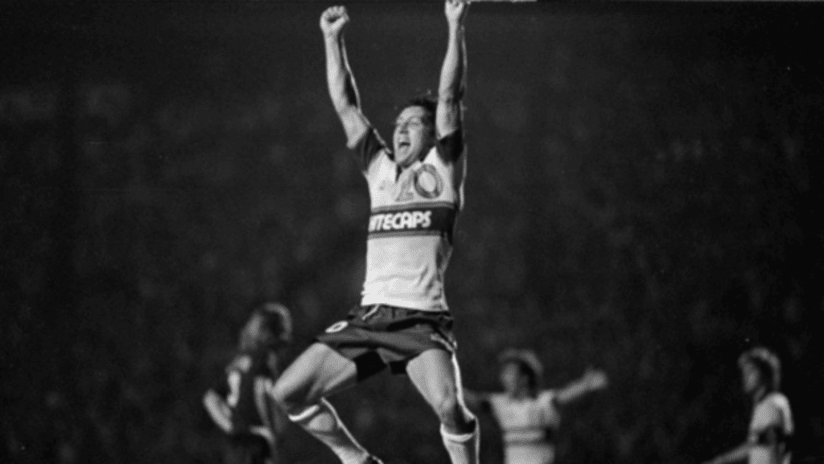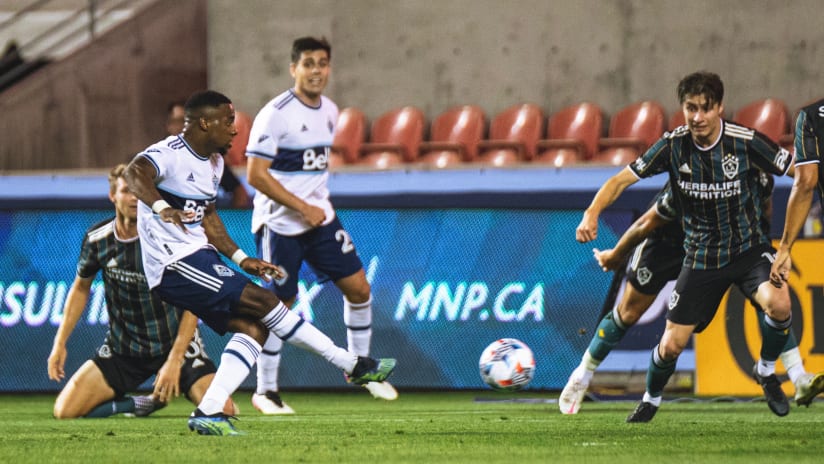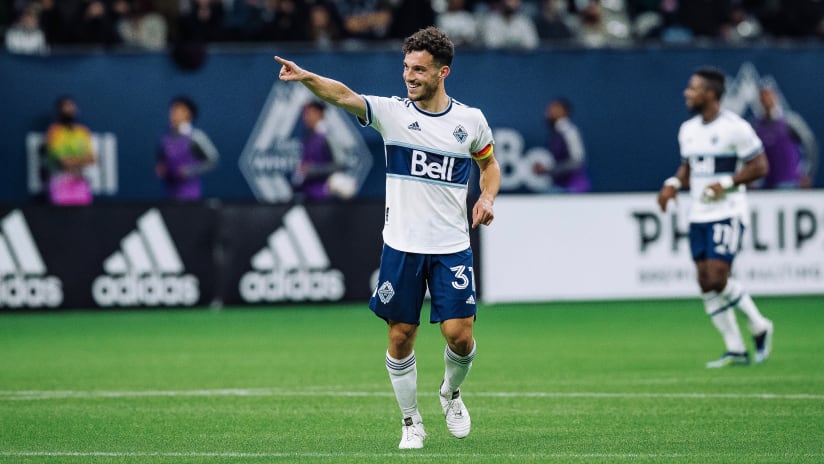Nostalgia runs deep with Thursday's release, at last, of the 2011 regular season schedule. Portland’s arrival will reignite arguably the nastiest rivalry in American soccer history with arch-rivals Seattle, and Vancouver’s addition turns that into a vicious hate triangle – not to mention a Canadian rival to Toronto FC’s as-yet unchecked dominance.
But if you dig a little deeper into the fixture list, there is one date in particular buried in the calendar that probably won’t be talked about...until later in the year. Few realize it, but it was a hugely important event that is a key reason why Vancouver is returning to top-flight soccer in 2011.
On September 10, Whitecaps FC will make their first-ever visit to Red Bull Arena. Of course, there’s no history between those two teams at all. But very quietly, that date falls 32 years almost to the day of the greatest moment in Vancouver soccer history where, just 10 miles up the New Jersey Turnpike, the Whitecaps beat Tampa Bay Rowdies in the 1979 Soccer Bowl to clinch their first and only title as an North American Soccer League (NASL) franchise.
Ironically, the trophy itself is something of a footnote in the in Whitecaps’ march to the crown. One week prior, on the same Giants Stadium turf, Vancouver stunned none other than the heavily-favored New York Cosmos in the second leg of the National Conference Championship in what is still considered one of the greatest games in NASL history.
It had everything: controversy, highlight-reel goals, incredible saves, contentious officiating. And it came to a head on a muggy Saturday afternoon in a game that lasted more than three-and-a-half hours. When it was over, the crowd wasn’t even sure what had happened.
Courtesy of New York Cosmos
“Without a doubt, one of the craziest, most bizarre games I’ve ever been involved in,” Cosmos star Giorgio Chinaglia (at right) admitted to MLSsoccer.com.
In a nutshell, we’ll try to give the five-minute summary. The fledgling ‘Caps were into the conference finals for the first time in their six-year history, but they’d made enemies with the star-laden Cosmos in many prior meetings.
Vancouver came into that second leg with a 2-0 victory at home. New York hosted the second leg down two key defenders – Carlos Alberto was suspended for allegedly spitting on an official while protesting a non-call, while Andranik Eskandarian (father of former MLS striker Alecko) was out with a red-card suspension.
Nearly 45,000 Cosmos fans smelled blood, and Chinaglia recalls the stands were “buzzing.” So he took matters into his own hands. By halftime, the prolific Italian had scored twice off delicious feeds from Vladislav Bogicevic and Seninho to put the home team up 2-1. But Vancouver’s Willie Johnston headed in a Bob Lenarduzzi cross to knot it at 2-2 six minutes before the final whistle.
Vancouver had a 4-2 aggregate win after 180 minutes – if only that’s how the NASL worked. By league rules, someone needed to win the game itself. Another 15 minutes of sudden-death overtime, and no one scored. New York won the ensuing shootout, giving them the victory … and a 30-minute “mini-game” to settle the deadlock.
“It was so strange,” Vancouver striker Carl Valentine told MLSsoccer.com. “You never knew what was next. We were all so exhausted and yet we just had to keep playing.”
Temperatures were still soaring and the players were running on adrenaline, recalls Valentine, who nearly ended matters himself as the mini-game came to a close. In the waning minutes, the Manchester-born former Canadian international beat Cosmos ‘keeper Hubert Birkenmeier and put his shot off the crossbar and onto the goal line.
The official signaled for a goal. The Whitecaps started celebrating, and the Cosmos began protesting, led, of course, by the irascible Chinaglia. Somehow, the referee bought their pleas and reversed his decision.
“I think I hit it with my left foot, which was absolutely useless,” laughed Valentine. “It was a once-in-a-lifetime thing. The New York team went over and basically had [the linesman] against the wall.”
After 90 minutes of regulation, 15 minutes of sudden death, a shootout and a 30-minute mini-game, matters were still in doubt. And the Giants Stadium faithful were almost as weary as the players after 145 ticks of the game clock. A second shootout would decide who would play in the Soccer Bowl a week later on the same field.
It wasn’t to be for the home team. Vancouver triumphed on penalties after Franz Beckenbauer and Ricky Davis both missed for the Cosmos. The final bit of controversy was the final kick by New York’s Nelsi Morais, who was judged to have taken too long and saw his goal waved off.
“It happens once in a while,” said Chinaglia, who is more philosophical these days about the titanic upset. “Things don’t go right. We had won [the title] the year before and won it again the next year. It was just one blip.”
But for as shocking as it was for the Cosmos, the result was immeasurable for the legacy of the Whitecaps. Late ABC broadcaster Jim McKay’s comment that “Vancouver must be like a deserted village right now” became an infamous rallying cry of the underdogs (even though he was referring to the masses glued to their TVs in their living rooms).
Courtesy of Vancouver Whitecaps FC
“People [in Vancouver] always remember where they were when that game was on,” recalled Valentine (at right), “probably not unlike the USA after that Olympic hockey game. That’s how big it was.”
That’s a perfect analogy – for most Americans, the US hockey team’s actual gold-medal victory over Finland is a mere footnote to the “Miracle on Ice” vs. the Soviet Union at the 1980 Olympic Winter Games. Much like the Whitecaps’ takedown of the mighty Cosmos was a bigger deal than the Soccer Bowl triumph a week later.
When Whitecaps FC return to New Jersey in September, it’ll bring up some grand memories of that moment 32 years ago. Without it, says Valentine, now an official ambassador with the new Whitecaps FC, there might not have been the groundwork for Vancouver’s MLS revival.
“We know that for us to be a successful franchise, we have to embrace the history of the club and nurture it,” he said. “That game is a huge part of the club’s history and what it’s done."





